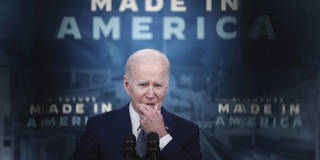Following the pandemic and globally disruptive conflicts like Russia's war against Ukraine, it is understandable that many countries would pursue policies to strengthen domestic economic resilience. But self-reliance strategies tend to lead to systemic instability and fuel international tensions – or worse.
CAMBRIDGE – Over the past three years, COVID-19 and the war in Ukraine exposed the vulnerabilities stemming from deep global economic integration. Now, governments and companies around the world have given high priority to shortening supply chains, rebuilding domestic production capacity, and diversifying suppliers. But these responses are motivated not only by pragmatic risk-management considerations but also by the goal of economic self-reliance, an aspiration that threatens to derail any stable restructuring of the global economy.

CAMBRIDGE – Over the past three years, COVID-19 and the war in Ukraine exposed the vulnerabilities stemming from deep global economic integration. Now, governments and companies around the world have given high priority to shortening supply chains, rebuilding domestic production capacity, and diversifying suppliers. But these responses are motivated not only by pragmatic risk-management considerations but also by the goal of economic self-reliance, an aspiration that threatens to derail any stable restructuring of the global economy.